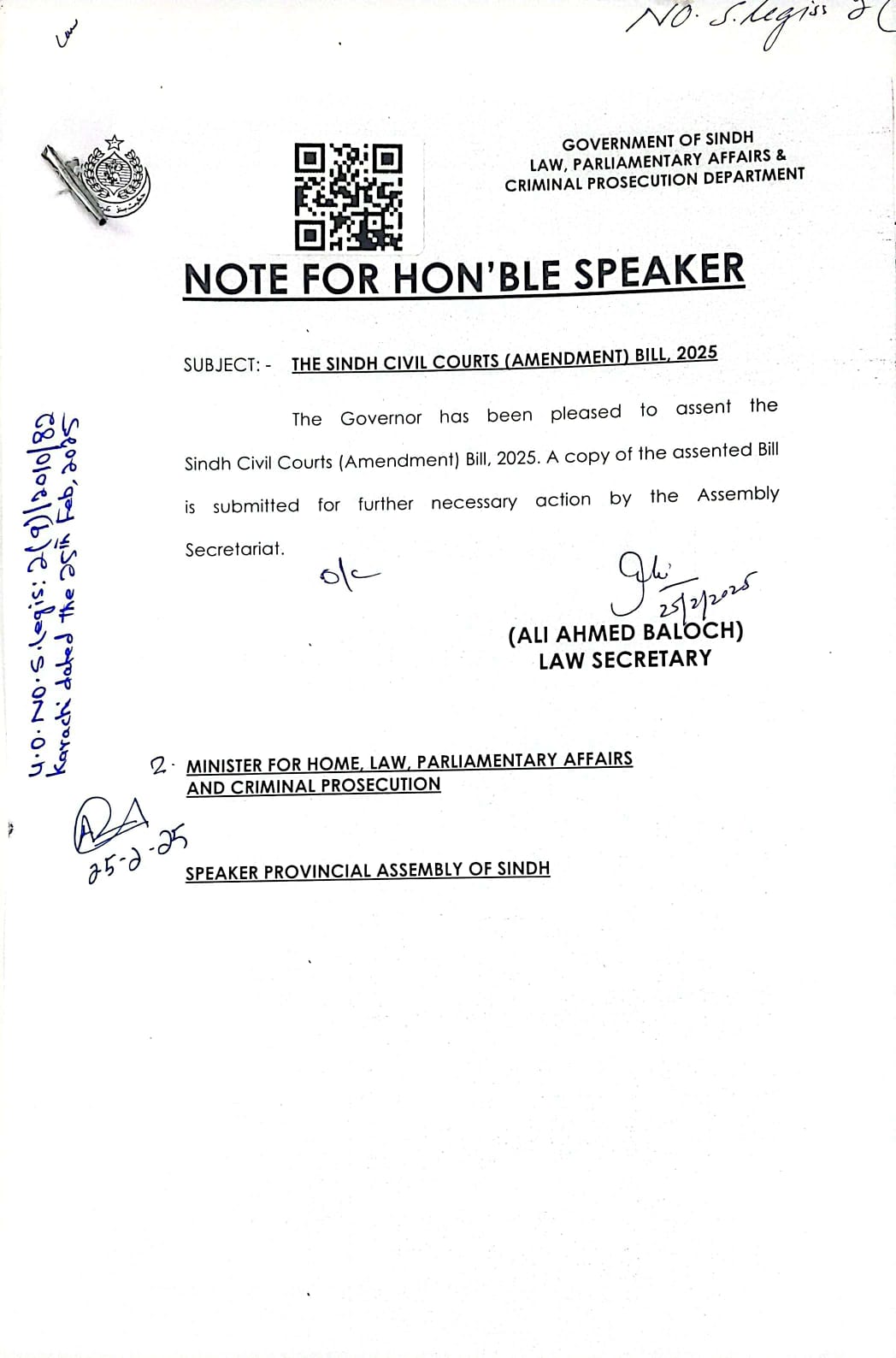Karachi, February 25, 2025 — In a long-standing legal battle to extend unlimited jurisdiction to the Karachi District Courts, a significant development has taken place. After years of petitions, debates, and legislative action, the Sindh Civil Courts (Amendment) Bill, 2025 has finally received assent from the Governor of Sindh on February 25, 2025. This milestone marks the culmination of persistent efforts by the Karachi Bar Association (KBA) and several prominent lawyers, who have been advocating for the expansion of jurisdiction in Karachi’s district courts, which had previously been limited to cases with a value of Rs. 6.5 crore.
The Beginning of the Legal Battle: 2018 Petition
The battle for unlimited jurisdiction began in 2018, when Advocate Ghulam Asghar Pathan filed a petition in the Sindh High Court arguing that the jurisdictional limit of Rs. 6.5 crore on Karachi’s district courts was a violation of fundamental rights. Advocate Pathan highlighted that such a limit disproportionately impacted the residents of Karachi, particularly given the city’s commercial and legal significance. The petition argued that restricting the district courts to cases below this value undermined the efficiency of the legal system, forced cases to be heard in higher courts, and delayed justice for many residents of the city.
2021 Petition: Expanding the Debate
The case was revisited in 2021, when Advocate Emadul Hassan filed another petition. His petition presented a compelling argument about how the jurisdictional limit affected the appeal process in Karachi. Advocate Hassan’s petition recognized that under the current system, the original jurisdiction of the Sindh High Court was affected, as appellate jurisdiction was restricted. If the district courts had unlimited jurisdiction, the Sindh High Court would have served as the appellate court with a single bench, instead of the Double Bench which was necessitated by the jurisdictional limits. Hassan’s petition stressed that the current system led to inefficiencies and further delayed the delivery of justice to the citizens of Karachi.
2022 Joint Sitting: Limited Progress
In 2022, a joint sitting was held to discuss the matter further. Judges from the Sindh High Court, along with representatives from the Sindh Assembly, convened to settle the issue. However, after lengthy deliberations, it was concluded that the jurisdictional limit would be increased from Rs. 6.5 crore to a higher amount. Despite the growing support for unlimited jurisdiction, this decision reflected the majority view, with only the Karachi Bar Association (KBA) firmly advocating for the removal of all jurisdictional limits.
The KBA, despite the outcome, continued to voice its opposition to the limited jurisdiction. The association argued that the constitutional principle of access to justice required that the district courts in Karachi be empowered with the ability to handle all civil and criminal cases, regardless of value, without the need to refer them to higher courts.
2024 Breakthrough: Sindh Assembly Passes the Bill
A major breakthrough came in 2024, when the Sindh Assembly finally passed the Sindh Civil Courts (Amendment) Bill, which sought to grant unlimited jurisdiction to the Karachi District Courts. The bill, however, faced further delays after it was sent to the Governor of Sindh for approval. The Governor initially sent the bill back for reconsideration, citing potential constitutional concerns and the broader implications for the province’s judicial structure.
Governor Assents to the Bill: February 2025
After months of uncertainty and political debate, on February 25, 2025, the Sindh Governor gave his assent to the Sindh Civil Courts (Amendment) Bill, 2025, effectively granting unlimited jurisdiction to the Karachi District Courts. The letter from the Law, Parliamentary Affairs & Criminal Prosecution Department confirmed the Governor’s assent, marking a significant step in the battle for judicial reform.
The assented bill now allows the Karachi District Courts to hear civil and criminal cases of any value, eliminating the previous limitations and streamlining the legal process in the city.
The Assent Letter:
The official communication from the Sindh Government reads as follows:
Government of Sindh
Law, Parliamentary Affairs & Criminal Prosecution Department
Karachi, February 25, 2025
NO. S. Regiss:
The Sindh Civil Courts (Amendment) Bill, 2025
The Governor has been pleased to assent the Sindh Civil Courts (Amendment) Bill, 2025. A copy of the assented Bill is submitted for further necessary action by the Assembly Secretariat.
The Significance of the Development
The Karachi Bar Association (KBA) has hailed this decision as a victory for justice and access to legal recourse. KBA President Advocate Muhammad Ali stated, “This is a significant step toward making the legal system in Karachi more efficient and accessible. The residents of Karachi, who contribute significantly to Pakistan’s economy, should have the right to seek justice in a timely manner without the constraints of outdated jurisdictional limits.”
Advocates and legal professionals across the city have expressed their satisfaction with the bill’s passage, asserting that the removal of jurisdictional limitations will expedite the judicial process, ease the burden on higher courts, and improve the overall functioning of the judicial system in Karachi.
Looking Ahead: Future Implications
With the Governor’s assent, the Karachi District Courts are now officially equipped with the power to hear cases of any type and value. This marks a historic shift in Karachi’s judicial landscape, promising a more efficient and accessible legal system for its residents. The move is expected to relieve the pressure on higher courts, particularly the Sindh High Court, and help streamline the resolution of commercial, civil, and criminal disputes in the city.
However, legal experts suggest that the full impact of the unlimited jurisdiction may take time to be felt, as the system adjusts to the new framework. Yet, for now, the KBA and the legal community can celebrate this hard-won victory as a critical milestone in their pursuit of justice and legal reform.


